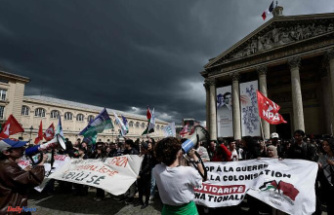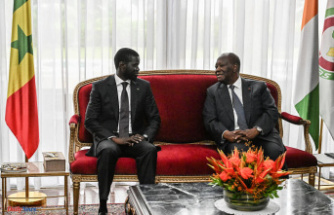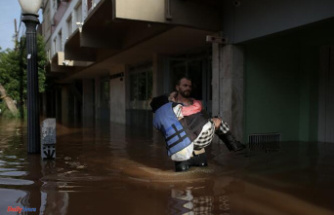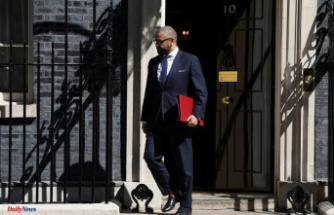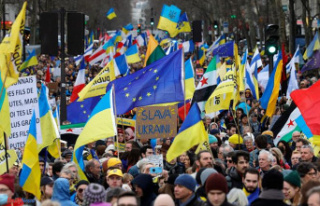The Israeli army announced the death of an additional soldier in Gaza on Saturday, February 24, bringing to 238 the number of its soldiers killed since the start of the ground operation on October 27, 2023 – in addition to the nearly 1,200 civilians and soldiers killed in Hamas attacks on southern Israel on October 7. On Saturday morning, Hamas said the number of Palestinians killed in the Gaza Strip in this war stood at 29,606 – a figure that cannot be independently verified and would include both combatants and civilians.
The Israeli war cabinet gave the green light on Saturday to sending a delegation to Qatar shortly to continue the discussions of recent days in Paris with a view to a new truce agreement in Gaza accompanied by the release of hostages, according to officials and local media.
An Israeli delegation led by Mossad chief David Barnea traveled to Paris on Friday to follow up on a truce project discussed at the end of January in the French capital with its American and Egyptian counterparts and the Prime Minister of Qatar.
“The delegation has returned from Paris, there is probably room to move towards an agreement,” Prime Minister Benjamin Netanyahu’s national security adviser, Tzachi Hanegbi, declared on Saturday evening on Israeli channel N12.
“The delegation asked to inform the war cabinet of the results of the Paris summit and that is why the war cabinet will meet this evening by telephone,” he added, shortly before the start of the meeting.
During the night, Israeli media clarified that the war cabinet had concluded its meeting by giving the green light to send a delegation to Qatar in the coming days in order to continue these negotiations with a view to an agreement for a truce of several weeks including the release of hostages in exchange for that of Palestinian prisoners in Israel.
According to a Hamas source, the plan could include a six-week pause in fighting and the release of 200 to 300 Palestinian prisoners in exchange for 35 to 40 hostages held by Hamas. Talks also took place this week in Egypt.
At the end of November, a first one-week truce negotiated under the aegis of Qatar, but also Egypt and the United States, allowed the release of more than a hundred hostages in the hands of Hamas and 240 Palestinians imprisoned in Israel.
According to Israel, 130 hostages – 30 of whom are believed to have died – are still being held out of the approximately 250 people kidnapped in Israel and taken to Gaza on October 7.
In Tel Aviv, thousands of people gathered on Saturday evening in “Hostage Square” to ask the government to promote the release of people still captive in Gaza, according to journalists from Agence France-Presse.
“We think about them all the time, we want them to come back to us alive and as quickly as possible. We will demonstrate again and again, until they return,” said Orna Tal, 60, a friend of Tsachi Idan kidnapped in the Nahal Oz kibbutz on October 7.
The demonstrators were also protesting the handling of the war by Prime Minister Benjamin Netanyahu's right-wing government, with some calling for new elections.
Scuffles with the police took place, and around twenty demonstrators were arrested, according to the Israeli press.
Demonstrations also took place in the cities of Jerusalem and Caesarea.
After ground operations in the cities of Gaza and Khan Younes, Israel is preparing for a ground offensive in Rafah, the last local stronghold of Hamas, where more than 1.4 million Palestinians are crowded together, the vast majority displaced by the fighting and the air raids in the rest of the territory.
“We are working to obtain another plan for the release of our abductees, as well as to complete the elimination of the Hamas battalions in Rafah,” Benjamin Netanyahu said in a statement on Saturday evening.
After the meeting on the Paris negotiations, "I will convene, at the beginning of the week, the cabinet to approve the operational plans of action in Rafah, including the evacuation of the civilian population", he added, while the UN is worried about a humanitarian catastrophe there.
According to an AFP journalist, at least six air raids were carried out on the city on Saturday evening.
More than four months after the start of the war in Gaza, the United Nations (UN) fears “a threat of mass famine” due to a lack of sufficient supplies of water and food.
On Friday, the UN High Commissioner for Human Rights, Volker Türk, denounced the "blockade and siege imposed on Gaza" by Israel which could "represent the use of starvation as a method of warfare" which is, he recalled, a “war crime.”
Determined to continue the war until the elimination of Hamas, the Israeli Prime Minister presented Thursday a “post-war” plan which plans to maintain the Gaza Strip, occupied from 1967 to 2005, under “security control” of Israel.
This plan was immediately rejected by Hamas and the Palestinian Authority. It also sparked a strong reaction from the United States, Israel's main ally, whose head of diplomacy, Antony Blinken, reaffirmed Washington's opposition to any "Israeli reoccupation" of Gaza.



